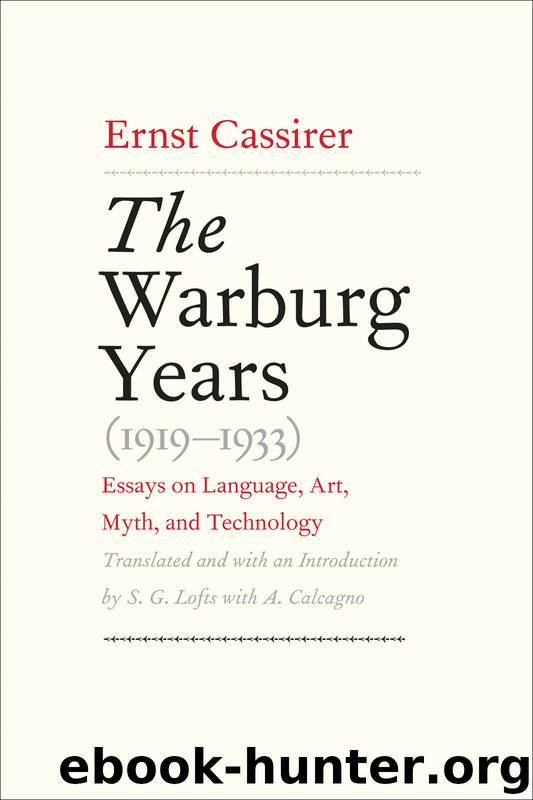The Warburg Years (1919-1933) by Ernst Cassirer

Author:Ernst Cassirer
Language: eng
Format: epub
Publisher: Yale University Press
Published: 2013-03-18T16:00:00+00:00
6
The preceding considerations have made us understand, above all, the close interweaving of mythical and linguistic thought; they have shown how the construction of the mythical and linguistic worlds is determined and ruled for a long time by the same spiritual motives. However, a basic motive, in which, as it appears, this relation not only actually shows itself but from which it can also be understood [verstehen] in its ultimate ground and origin, has so far remained unnoticed. That myth and language are subordinated to the same or analogous spiritual laws of development ·145· can, in the end, be truly comprehended only if we succeed in demonstrating a common root from which both spring. The commonality in their achievements, in their configurations, also clearly points here to an ultimate commonality in the function of configuring itself. In order to make out this function as such, and to present it purely for itself, we must pursue the ways that the development of myth and language have undergone, not forward but backward—we must return to the point from which the two lines diverge. And this indeed seems to be demonstrable, for however much the contents of myth and language can be distinguished, one and the same form of spiritual apprehension is effective in both. It is this form that we can describe as the form of metaphorical thought. It appears that we must return to the essence and meaning of the metaphor if we want to grasp the unity, on the one hand, and the difference, on the other hand, of the mythical and linguistic worlds.
It is frequently emphasized that it is the metaphor that ties the spiritual bond between language and myth. In the precise determination of this process and the direction that it follows, however, theories differ greatly from each other. In one, the real origin of the metaphor is sought first in linguistic formation, in another it is sought in mythical fantasy. Sometimes it is the word that begets the mythical metaphor through its originally metaphoric character, and it must constantly supply the metaphor with new nourishment; sometimes, on the contrary, it is the metaphoric character of words that is regarded as an indirect result, as an inheritance, that language receives from myth and that it holds in fee from it. Herder, for example, has emphasized this primary mythical character of all verbal and linguistic concepts in his excellent essay On the Origin of Language.
Given that the whole of nature resounds: nothing is more natural for a sensory human being than that it lives, speaks, and acts. The savage sees the high tree with its splendid summit and admires—the summit rustled! That is a stirring deity! The savage falls down and prays! See, here, how the history of the sensory human being, the dark bond, comes out of the verbis nomina [verbal nouns]—and with it the easiest step toward abstraction! For the savages of North America, for example, everything is still animated; every object has its genius, its spirit,
Download
This site does not store any files on its server. We only index and link to content provided by other sites. Please contact the content providers to delete copyright contents if any and email us, we'll remove relevant links or contents immediately.
The remains of the day by Kazuo Ishiguro(8969)
Tools of Titans by Timothy Ferriss(8363)
Giovanni's Room by James Baldwin(7322)
The Black Swan by Nassim Nicholas Taleb(7105)
Inner Engineering: A Yogi's Guide to Joy by Sadhguru(6785)
The Way of Zen by Alan W. Watts(6600)
Asking the Right Questions: A Guide to Critical Thinking by M. Neil Browne & Stuart M. Keeley(5757)
The Power of Now: A Guide to Spiritual Enlightenment by Eckhart Tolle(5746)
The Six Wives Of Henry VIII (WOMEN IN HISTORY) by Fraser Antonia(5496)
Astrophysics for People in a Hurry by Neil DeGrasse Tyson(5181)
Housekeeping by Marilynne Robinson(4436)
12 Rules for Life by Jordan B. Peterson(4299)
Double Down (Diary of a Wimpy Kid Book 11) by Jeff Kinney(4260)
The Ethical Slut by Janet W. Hardy(4241)
Ikigai by Héctor García & Francesc Miralles(4240)
Skin in the Game by Nassim Nicholas Taleb(4235)
The Art of Happiness by The Dalai Lama(4125)
Skin in the Game: Hidden Asymmetries in Daily Life by Nassim Nicholas Taleb(3987)
Walking by Henry David Thoreau(3952)
